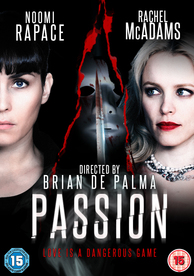FROM RODERICK HEATH & NOEL MURRAY
 At left is Metrodome's cover for the U.K. DVD edition of Brian De Palma's Passion. Ferdy On Films' Roderick Heath posted a review of the film this week-- here are some highlights from his review (SPOILERS might occur):
At left is Metrodome's cover for the U.K. DVD edition of Brian De Palma's Passion. Ferdy On Films' Roderick Heath posted a review of the film this week-- here are some highlights from his review (SPOILERS might occur):"One aspect of De Palma’s career that remains unique is that in spite of his advancing age, his thematic interests only seem to have become more relevant, to the point where it feels like he’s one of the very few filmmakers actually wrestling with one of the great aspects of the modern world: its saturation by media that can potentially turn every experience into an observed one, a perpetual loop of present-tense that is also past-tense, moment and document."
...
"The main problems of Passion stem from its translation of Corneau’s film and De Palma’s half-hearted annexation of its actual storyline. Whereas the original offered a certain sly, dark humour and obliquely considered consequence in its resolution, De Palma deconstructs everything to the point where suspense and empathy are essentially rendered unimportant: Christine, Isabelle, Dirk, and Dani are all pretty loathsome, whilst the representatives of the law, a bullying prosecutor (Benjamin Sadler) and stern cop (Rainer Bock) who becomes smitten with Isabelle, are, ironically, increasingly castrated. [Noomi] Rapace feels faintly miscast as a victimised fawn with a neurotic psycho under the surface, though that might be a result of associating her too much with her canonical role. [Rachel] McAdams, on the other hand, seems best in key with the film’s sly-malicious tune, particularly when Christine tries to bully Dani by setting her up on a sexual assault charge, an apex of campy humour. De Palma loves reiterating that his characters and their plights are all inventions, variations on themes that can be suddenly turned in upon themselves, revised, sent into rewind, or erased altogether, usually with some moment of choice from which guilt or complicity, a nexus of consequence both for good and evil, is identified."
TWO SEQUENCES STAND AMONG DE PALMA'S BEST
The Dissolve's Noel Murray feels that "for the first half-hour or so, Passion feels lackadaisical, with Rapace and McAdams coming off as awfully stiff. Then, right around the time Isabelle makes a bolder play for recognition—and is countered by an even more ruthless move from Christine—De Palma wakes up. After a hilariously over-the-top music cue by composer (and frequent De Palma collaborator) Pino Donaggio, the movie’s pace quickens and its style becomes more expressionistic, with longer shadows and more extreme angles. Before Passion ends, De Palma comes through with two sequences (neither of which originated with Love Crime) that can stand among his best: one where Christine is stalked on half a split-screen while the other half shows a fourth-wall-breaking performance of The Afternoon Of A Faun, and another that wordlessly sends four characters in pursuit of each other inside and outside Isabelle’s apartment."
Murray concludes his review by noting De Palma's focus on the visual: "With Passion, De Palma is on more familiar ground, using the world of the erotic thriller to note how Skyping, sexting, and tiny pocket cameras are changing behavior, putting everyone in the spotlight and distracting the eye. That’s ultimately what makes Passion a more effective film than the one it’s remaking. While Corneau and Carter were telling a story about what their characters do and don’t see, De Palma is more engaged with what the audience sees. There’s always something to look at in the background of Passion, from the erotic paintings on the walls of Christine’s flat to the video billboards posted around Berlin, and always something eye-catching in what the characters wear, or how they’re posed. The movie is one long game of misdirection, playing tricks on viewers from scene to scene, and showing how easy it is to steer a crowd into missing something important. That’s the real De Palma touch, even more than the operatic overtones and excess."



